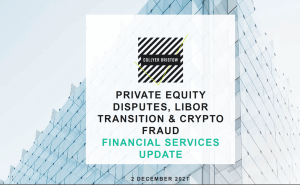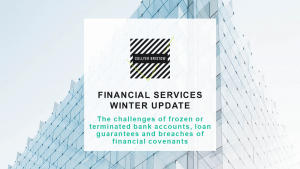- Banking & financial disputes
- Private Equity
- Financial services

Longer Reads
Cov-lite covenants leading to disputes between borrowers and lenders
Many debt investors have, in recent years, been lending on more relaxed terms as they have been fighting to achieve high returns in a difficult market. As a result, many leveraged loans have been made with much looser financial covenants (so called “Cov-lite provisions”).
2 minute read
Published 14 December 2020
Key information
- Specialisms
- Dispute Resolution
- Business
- Sectors
- Financial services
The Covid-19 pandemic has meant that many businesses are needing to take on additional debt. Some have been attempting to take advantage of looser Cov-lite loan provisions to transfer assets into subsidiaries out of reach of lenders and then use those assets as security for new loans. An example of this is the UK tourism company Travelport where the lockdown led to a sale of part of the business falling through. That prompted a need by the company to seek alternative funds and it transferred intellectual property rights to two subsidiaries which could then be used as security for new loans. The company’s existing lenders disagreed that that company was allowed to transfer its IP rights under the terms of the loan documentation and a dispute (now settled) arose which centred on the correct value which could be attributed to those rights.
Negotiating potential breaches of loan covenant
In the current Covid-19 crisis, thousands of businesses that in normal times would be in no danger of defaulting on their bank loans will need additional support from their banks in the coming weeks and months. Banks also recognise the devastating effect that mass defaults will have on their own businesses and the priority for them must be to help as many businesses as possible to survive this crisis. It is therefore vital that both borrowers and lenders work together to avoid unnecessary loan defaults and it is expected that there will be intensive negotiations between them to find a way through threatened or actual defaults.
In order to avoid unnecessary defaults, a borrower first needs a clear understanding of its financial position and what financial covenants are included in its lending agreements so that it can monitor which potential defaults may exist.
Borrowers need to know the dates on which financial covenants will be tested and be aware of whether it is likely that such covenants will be breached on those test dates. In the current crisis, covenants which test whether there is sufficient profit and/or cashflow to cover the interest payments on the debt, such as cashflow cover, interest cover and debt service cover, will be particularly important.
Once a borrower becomes aware that one or more financial covenants is in danger of being breached, it is advisable to speak to its lenders as soon as possible and ideally before any covenants are actually breached in order to avoid a default.
If a potential breach has been identified, customers also need to speak to their lawyers as soon as possible since a covenant breach, no matter how minor, is a technical violation of the loan agreement and may have significant legal consequences.
Although the bank may have the right to accelerate the loan and demand immediate payment following an event of default, it may be possible to mitigate the consequences by negotiation.
The terms of the covenant may provide for a grace period to allow time for the breach to be cured. If no such provision exists, it may be possible to negotiate with the lender to agree to waive the breaches to allow compliance with the covenants.
Other steps may be possible to avoid events of default and maintain a functioning relationship between the company and its bankers. These might include adjusting the borrower’s financial figures. There have been examples this year of businesses substituting last year’s profit figures to avoid the effect of Covid-19. However, this approach is not advisable without the lender’s agreement
Alternatively, it might be possible to ask the lender to:
- suspend covenant test dates
- amend covenant thresholds temporarily
- waive breaches
- reduce penalties
Legal assistance may be useful in order to ensure the correspondence between the parties is very clear to avoid disputes in future about what was agreed.
Related content
Longer Reads
Cov-lite covenants leading to disputes between borrowers and lenders
Many debt investors have, in recent years, been lending on more relaxed terms as they have been fighting to achieve high returns in a difficult market. As a result, many leveraged loans have been made with much looser financial covenants (so called “Cov-lite provisions”).
Published 14 December 2020
Associated sectors / services
Authors
The Covid-19 pandemic has meant that many businesses are needing to take on additional debt. Some have been attempting to take advantage of looser Cov-lite loan provisions to transfer assets into subsidiaries out of reach of lenders and then use those assets as security for new loans. An example of this is the UK tourism company Travelport where the lockdown led to a sale of part of the business falling through. That prompted a need by the company to seek alternative funds and it transferred intellectual property rights to two subsidiaries which could then be used as security for new loans. The company’s existing lenders disagreed that that company was allowed to transfer its IP rights under the terms of the loan documentation and a dispute (now settled) arose which centred on the correct value which could be attributed to those rights.
Negotiating potential breaches of loan covenant
In the current Covid-19 crisis, thousands of businesses that in normal times would be in no danger of defaulting on their bank loans will need additional support from their banks in the coming weeks and months. Banks also recognise the devastating effect that mass defaults will have on their own businesses and the priority for them must be to help as many businesses as possible to survive this crisis. It is therefore vital that both borrowers and lenders work together to avoid unnecessary loan defaults and it is expected that there will be intensive negotiations between them to find a way through threatened or actual defaults.
In order to avoid unnecessary defaults, a borrower first needs a clear understanding of its financial position and what financial covenants are included in its lending agreements so that it can monitor which potential defaults may exist.
Borrowers need to know the dates on which financial covenants will be tested and be aware of whether it is likely that such covenants will be breached on those test dates. In the current crisis, covenants which test whether there is sufficient profit and/or cashflow to cover the interest payments on the debt, such as cashflow cover, interest cover and debt service cover, will be particularly important.
Once a borrower becomes aware that one or more financial covenants is in danger of being breached, it is advisable to speak to its lenders as soon as possible and ideally before any covenants are actually breached in order to avoid a default.
If a potential breach has been identified, customers also need to speak to their lawyers as soon as possible since a covenant breach, no matter how minor, is a technical violation of the loan agreement and may have significant legal consequences.
Although the bank may have the right to accelerate the loan and demand immediate payment following an event of default, it may be possible to mitigate the consequences by negotiation.
The terms of the covenant may provide for a grace period to allow time for the breach to be cured. If no such provision exists, it may be possible to negotiate with the lender to agree to waive the breaches to allow compliance with the covenants.
Other steps may be possible to avoid events of default and maintain a functioning relationship between the company and its bankers. These might include adjusting the borrower’s financial figures. There have been examples this year of businesses substituting last year’s profit figures to avoid the effect of Covid-19. However, this approach is not advisable without the lender’s agreement
Alternatively, it might be possible to ask the lender to:
- suspend covenant test dates
- amend covenant thresholds temporarily
- waive breaches
- reduce penalties
Legal assistance may be useful in order to ensure the correspondence between the parties is very clear to avoid disputes in future about what was agreed.
Associated sectors / services
- Banking & financial disputes
- Private Equity
- Financial services
Authors
Need some more information? Make an enquiry below.
Subscribe
Please add your details and your areas of interest below
Article contributor
Robin
HenryPartner - Head of Dispute Resolution Services
Specialising in Banking & financial disputes, Commercial disputes, Corporate recovery, restructuring & insolvency, Financial regulatory and Personal insolvency
Enjoy reading our articles? why not subscribe to notifications so you’ll never miss one?
Subscribe to our articlesMessage us on WhatsApp (calling not available)
Please note that Collyer Bristow provides this service during office hours for general information and enquiries only and that no legal or other professional advice will be provided over the WhatsApp platform. Please also note that if you choose to use this platform your personal data is likely to be processed outside the UK and EEA, including in the US. Appropriate legal or other professional opinion should be taken before taking or omitting to take any action in respect of any specific problem. Collyer Bristow LLP accepts no liability for any loss or damage which may arise from reliance on information provided. All information will be deleted immediately upon completion of a conversation.
Close








































































